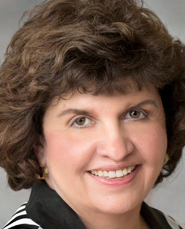Submitted on
Welcome to another round of 10 Words or Less, in which I ask brief questions and seek brief answers from interesting people. Today’s participant is a nationally recognized nutritionist who started her practice, Renaissance Nutrition Center Inc., near Philadelphia 23 years ago; I’ve been a client for more than a decade. Remember, no counting. The 10-words thing is a goal, not a rule, and besides, let’s see you do it.
 Name H. Theresa Wright
Name H. Theresa Wright
Born when, where “Long ago in a little mining town in Northeastern Pennsylvania.”
Family situation “Married 44 years to the sweetest, kindest, most gentle man in the world.”
Formative event in your youth “They called my father to school and asked if I could go to college.”
Someone outside your family who has inspired you “You, Michael. Your courage, your persistence, your dedication to writing your book.”
First job “I was a quality control chemist in a licorice factory.”
How long have you been a nutritionist? “Thirty-two years.”
Why did you pick that? “I wanted to be an electrical engineer. Daddy said girls couldn’t be one. I picked the part of home economics that had the most science, and I fell in love.”
The biggest change you’ve seen in eating behavior “We’re eating much more of what David Kessler calls “edible food-like substances” than we ever did before.”
If you could, what change in food would you enforce? “I’d rather educate than force.”
Do you believe food addiction exists? “Of course.”
How do you define it? “As a physical sensitivity to certain foods with a compulsion to continue eating those foods.”
It is different from compulsive eating? “Yes.”
How? “There’s a physical sensitivity. Compulsive eating, for me, is primarily emotional.”
Is the distinction important? “I think so. If a compulsive eater handles her emotional problem, she might no longer eat compulsively. If a food addict handles her emotional problem, she still has the physical sensitivity.”
Are you an RD? “Yes.”
Do most RDs believe in food addiction? “No, but as the evidence continues to accumulate, more will.”
Why? “Addiction is a specific group of behaviors that are subtle and easy to hide, deny, or misinterpret.”
Are you a food addict? “No, but my clients and colleagues have taught me about it.”
Your biggest challenge around eating “Creating vegetable recipes my husband will enjoy.”
Something new you’re working on “A book.”
Tell me about it “It’s about what food addiction is and helps people learn how to deal with it. I’m also writing a cookbook.”
The one thing you wish everyone would get right “Have more compassion for yourself and for other people.”
Note: This is the second interview in a row in which a respondent has cited me in an answer. I didn’t put them up to it, and I struggled whether to edit me out. I’m open to your feedback.
- Michael's blog
- Log in to post comments